Firing head coach D.J. Smith as many Ottawa Senators fans are demanding would be a mistake – at least for now. Senators management needs to give him some more time to demonstrate that he can guide his underperforming team to success this season – and that’s an appearance in the postseason.
Related: 5 Reasons the Senators May Not Make the 2024 Playoffs
Judging by the chants of “Fire DJ” from every corner of Canadian Tire Centre (CTC) earlier this month, a visitor from Mars would have concluded that the Senators’ disappointing performance so far this season is all the fault of one man – Smith. He and he alone could make this team a winner and since he hasn’t, he has to go.
It is nothing more than fantasy to think that turning a run-of-the-mill team like the Senators into a good one is as simple as putting Smith’s head on a pike on Parliament Hill. There’s no doubt that firing the coach of a struggling team in mid-season feels good for many fans, but by itself, it generally doesn’t work. The cries of “Fire DJ” are just a knee-jerk reaction from fans demanding instant gratification and simple fixes to a complex problem.
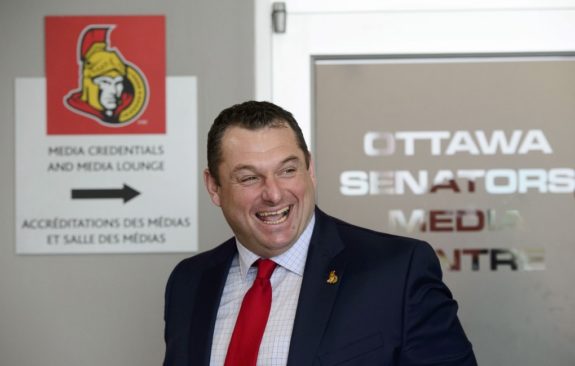
Let’s take a look at the evidence as to how effective in-season coach firings are in the NHL.
Senators’ Limited Success With In-season Coaching Changes
Here’s a look at coaching changes the Senators have made in the salary cap era beginning in the 2005-06 season to the present (from Corey Masiak, “Does the in-season coaching change really work in the NHL”, The Athletic, 13/12/2019). The number in brackets is the points percentage (PTS%) the team registered under the coach noted, while the ranking notes their position in the conference in which the Senators were competing in the season in question before and after the coaching change.
| Date | Out | In | Before | After | Postseason |
| 2/27/08 | John Paddock | Brian Murray | 36-22-6 (.609) 3rd | 7-9-2 (.444) 7th | 1st Round |
| 2/2/09 | Craig Hartsburg | Cory Clouston | 17-24-7 (.427) 13th | 19-11-4 (.618) 19th | None |
| 12/8/14 | Paul MacLean | Dave Cameron | 11-11-5 (.500) 10th | 32-15-8 (.655) 7th | 1st Round |
| 3/1/19 | Guy Boucher | Marc Crawford | 27-37-5 (.383) 16th | 7-10-1 (.417) 16th | None |
When it comes to making in-season coaching changes, the Senators qualify as a frequent flyer. From 2005-06 up until the 2018-19 season, (the latest in which the Senators made an in-season coaching change) the team’s four changes put them among the NHL’s top six teams for coaching changes made during the season.
Related: Ottawa Senators Coaching History
By any standard, the Senators have seen only middling results from firing coaches in-season. After Murray stepped in to replace Paddock at the end of the 2007-08 campaign, the Senators’ points percentage actually dropped as did their ranking in their conference. That they made the playoffs was largely due to the .609 PTS% they notched under Paddock.
The Senators saw the most success with an in-season coaching change in 2013-14 when Cameron (now the Ottawa 67s head coach) stepped in to replace MacLean and take the team from a .500 to a .655 PTS% and into the playoffs for one round.
There was a slight bump in PTS% when Crawford replaced Boucher as bench boss and an impressive jump when Clouston took over from Hartsburg. Even so, none of it mattered with the team failing to see postseason play under either new coach.
Do In-season Coaching Changes in the NHL Work?
The short answer is yes – sort of. In 58 in-season coaching changes in the NHL from the start of the salary cap era to the end of the 2019-20 season that The Athletic examined, 46 resulted in a better PTS%. Teams that made in-season coaching changes during this period registered an average PTS% of .479 with the old coach, and .535 afterward.
Even so, that’s a difference of just nine points — collectively, the teams played at a 78.6-point pace before the coaching change and 87.7 after. And that’s not anywhere close to what teams need to make the postseason these days.
Yet that doesn’t stop all the general manager wannabes in Ottawa from clamouring for a new coach in Bytown. Why just look at the St. Louis Blues in 2018-19 under Craig Berube they’ll exclaim! Berube took over in November 2018 and voila! He took his last-place team to a Stanley Cup championship in the spring of 2019. It’s simple – management just needs to hire the right coach.
Then they’ll point to the Vegas Golden Knights who went to the Stanley Cup Final in 2018 as a motley expansion team under the brilliant coaching of Gerard Gallant. (never mind that he flamed out with the New York Rangers last season coaching his 107-point team right out of the playoffs in the first round)
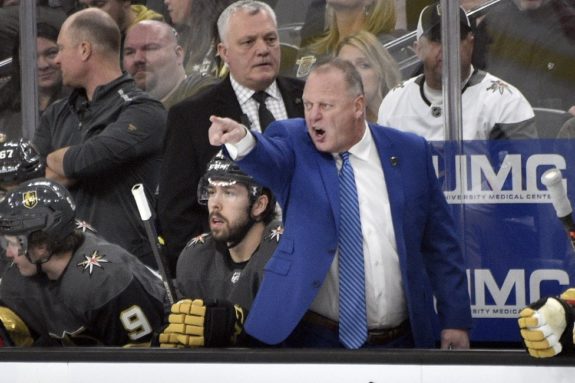
Former Calgary Flames coach and rancher, Darryl Sutter, left his cows behind in Viking, Alberta and headed to glamorous Los Angeles to coach the Kings in December 2011. He led them to their first Stanley Cup that season and did it again in 2013-14. And let’s not forget Mike Sullivan who coached his Pittsburgh Penguins to two consecutive championships after being made bench boss in December 2015.
The reality is that there’s more to these instant success stories than meets the eye. Sure, St. Louis won Lord Stanley’s mug in 2019, but it’s hard to say how much of the credit lies with Berube’s coaching and what belongs to the team’s twine minder Jordan Binnington. The Richmond Hill, Ontario native backstopped the Blues in 26 playoff games that year to notch a goals-against average (GAA) of 2.46 and a save percentage (SV%) of .914 to win his first Cup in his rookie season.
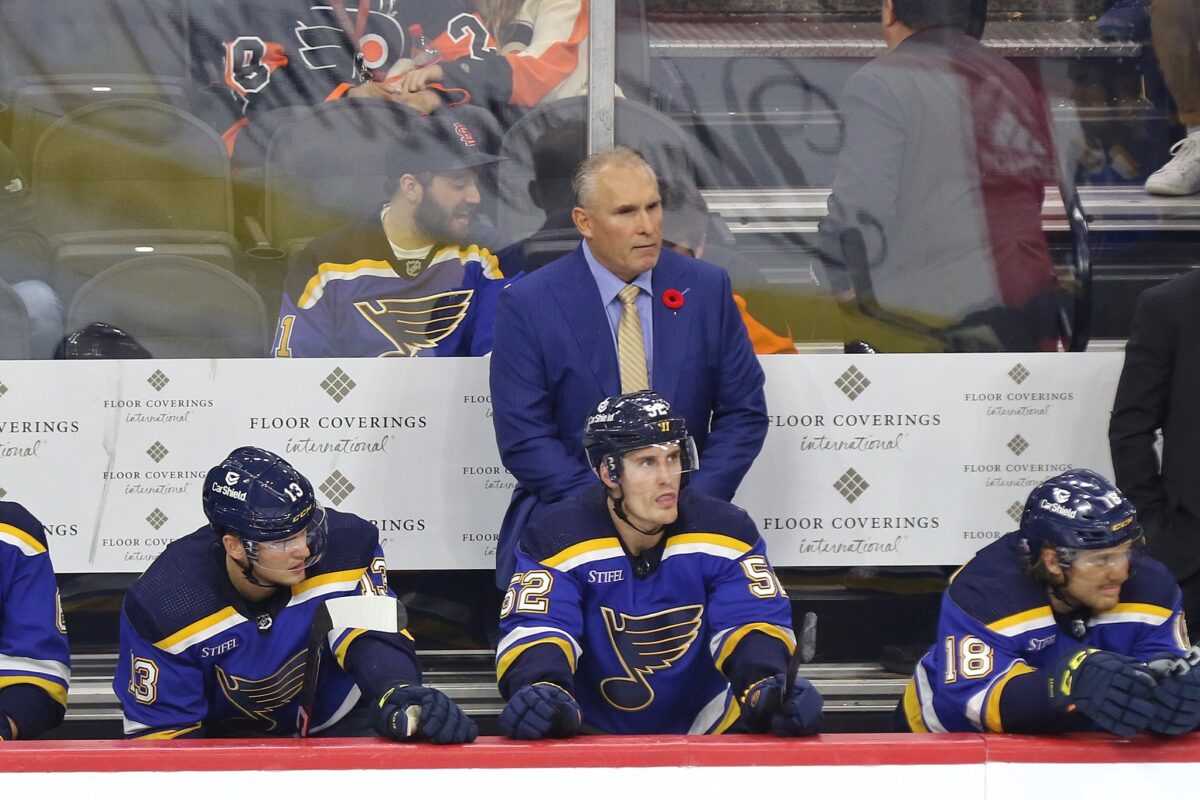
Sometimes the turnaround of an underperforming team has nothing at all to do with a coaching change in mid-season. Peter Laviolette became the Philadelphia Flyers’ bench boss in December 2009 and coached them to the Stanley Cup championship series in the spring of 2010. Yet that had more to do with the collapse of several teams favoured to win the Cup that year than Laviolette’s coaching prowess. After all, his Broad Street Bullies notched a meagre .535 PTS% playing for him – slightly lower than they did for his predecessor John Stevens.
What should be sobering for Ottawa fans howling for a coaching change is that from the 2005-06 season to the 2019-20 season, The Athletic found that less than one-third of teams who made a coaching change during the season achieved a PTS% of more than .600. For the Senators to guarantee themselves playoff action next spring they’ll need to rack up a PTS% north of .650 from now to the end of the season. For a wild card spot, they’ll need to play at least .590 from here on out.
Bad Reasons for Firing an NHL Coach Mid-Season
It almost goes without saying that teams who change their coaches in-season are usually young teams who are at times awful, but are expected to make the playoffs. They just aren’t on track to do it. In other words, they are teams just like this year’s edition of the Senators.
Yet if teams truly are good ones, they will usually turn things around regardless of whether or not a new coach is in place. Except when a coach has lost the room, changes behind the bench don’t often live up to the expectations of frustrated fans who called for them in the first place. By all accounts, the Senators love Smith.
A common refrain among old school hockey fans in Ottawa is that an underperforming team needs a tough, no-nonsense “old school” coach who will kick pampered, over-paid players into line. This, of course, is poppycock as I explained in the article below.
Related: Flames Old-School Coaches Couldn’t Handle Today’s Players
Even if that style of coaching ever did work, it won’t work with today’s NHLers. They simply don’t and won’t tolerate abuse. Just ask Sutter who was shown the door in Calgary at the end of last season after little more than two seasons behind the bench – only one of which could be considered successful. After his first full season in Cowtown in 2021-22, the team’s top stars left, and those who remained simply stopped playing for him. Multimillion-dollar hockey players have options.
The NHL Coaching Carousel
The job of head coach in the NHL is one of the most precarious in the league. It truly is a carousel. Of the 32 head coaches in the NHL today, only five have been in their current coaching job for five or more years. Here they are:
| Head Coach | Season First Appointed | Team | Record |
| Jon Cooper | 2012-13 Mid-Season | Tampa Bay Lightning | Stanley Cup – 2020 and 2021 |
| Mike Sullivan | 2015-16 Mid-Season | Pittsburgh Penguins | Stanley Cup – 2016 and 2017 |
| Jared Bednar | 2016-17 | Colorado Avalanche | Stanley Cup – 2022 |
| Rod Brind’amour | 2018-19 | Carolina Hurricanes | Five consecutive playoff appearances including two conference final series |
| Craig Berube | 2018-19 Mid-Season | St. Louis Blues | Stanley Cup 2019 |
Note that of these five, three were mid-season changes and they coached their teams to at least one Stanley Cup championship. It seems stability behind the bench can pay off.
Of the NHL’s current 32 head coaches, 23 were appointed to their current coaching jobs in or after the 2020-21 season. In fact, 18 of those 32 coaches have been in their current coaching posts for less than a full season.
Brian Burke, Executive Director of the Professional Women’s Hockey League Player’s Association and former NHL head coach and executive blames owner impatience for the breathtaking number of coaching changes in the league. Burke says, “It is a lot easier to turn around a business in some other area than it is in hockey and pro sports, and the Berube factor does not help.”
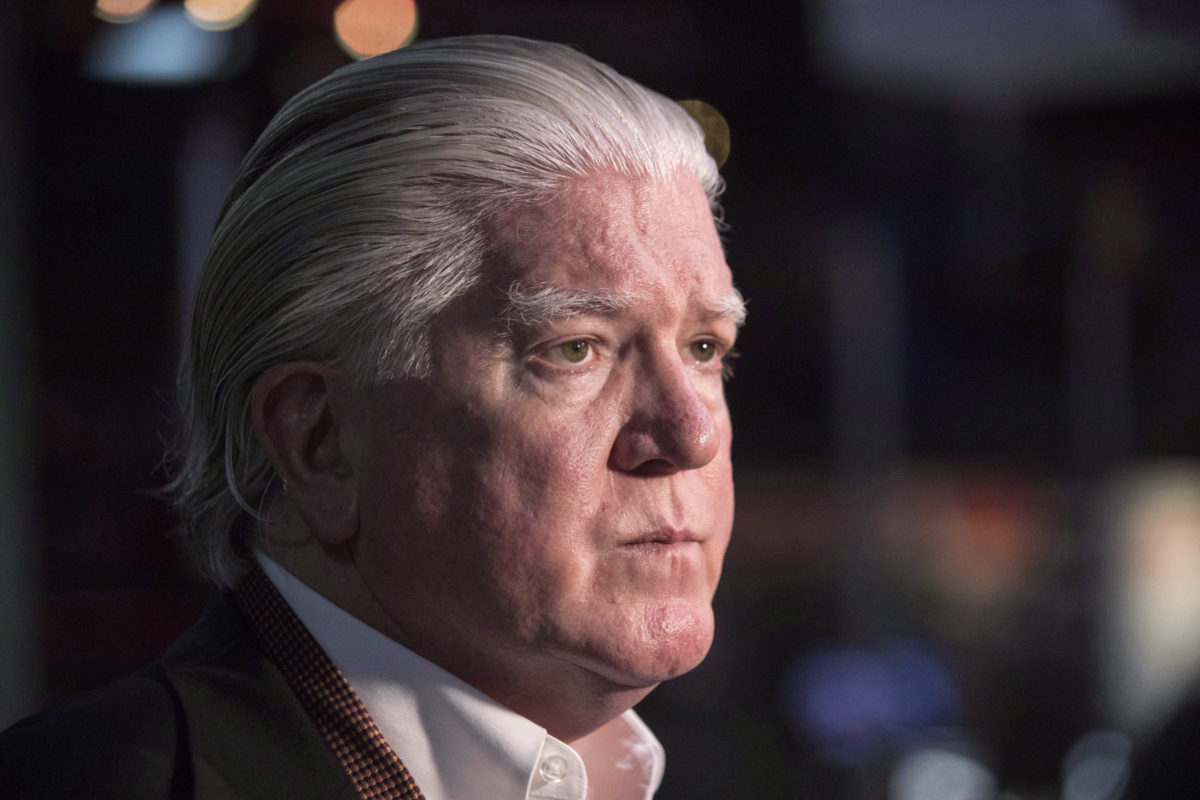
Sportsnet analyst Pierre McGuire puts the blame on hockey fans explaining, “I think people look at history in the league and ownerships in particular, and say: ‘What about us? You’ve told us about this five-year plan, or four-year plan and these guys are doing it in one year, and in some instances six months.’ That’s what leads to itchy trigger fingers.”
Whether it’s the unrealistic expectations of owners or fans that lead to willy-nilly coaching changes, there is a need for stability behind the bench. As Barry Trotz, now GM of the Nashville Predators and a former head coach with decades of experience coaching in the NHL explains, “What happens when you’re winning, you’re the smartest guy on the planet. When you’re losing, you don’t know a thing. You need people when things aren’t going well. In this business, when it’s not going well, you have the fan base, you have the media on you. You need someone that trusts what you’re doing and can say, ‘Hey, I believe in you and I don’t see that there’s a change needed.”‘
Bad Coaching Doesn’t Explain All Problems with Bad NHL Teams
It’s clear that firing a coach can sometimes bring instant success in the NHL. Yet examples of that are few. Firing the coach of an underperforming team like the Senators may be gratifying for a week or so, but then the question becomes who does the team hire to replace him?
What’s more, does anyone really believe that a team’s coach is the most important factor in its success? Do they really possess the magic needed to make a mediocre team like the Senators great?
And does anyone really believe that a coach is responsible for a star player tanking? The Edmonton Oilers sacked Jay Woodcroft last week, but neither Leon Draisaitl nor anyone else lacing up for the Oilers under their new coach Kris Knoblauch is any better this week.
If coaches were that important to the success of a franchise then why do teams eat them up and spit them out before most of them have had a chance to leave their imprint on a team? And after they’ve been fired, why do many coaches go on to find success with other teams?
Players and players alone author their destiny – not coaches. Ultimately, good players accept responsibility for their results. They don’t blame failure on their coach and fans shouldn’t either. Even the best coach can’t do much about a bad team.
D.J. Smith Doesn’t Deserve to Be Fired – Yet
Many Senators fans will continue to believe in the fairy tale that all that separates the Senators from greatness is a good coach. And so it is that the Senators are just one more losing streak away from hearing cries of “Fire DJ” thunder down again from the rafters in CTC.
Smith’s sense of humour will help him weather the storm. It was on full display in a Nov. 7 press conference when he explained, “When people say ‘Fire DJ’ I just said to my wife I just hope they don’t yell ‘Fire Dad’ because then [my kids will] know they’re talking about me.
Also helping him will no doubt be the loyalty of his players. Claude Giroux summed that up in the same presser telling members of the media that, “It’s getting pretty old. The fans and the media talking about D.J. It’s pretty frustrating actually. He’s our coach, he’s not going anywhere. We want to play for him.”
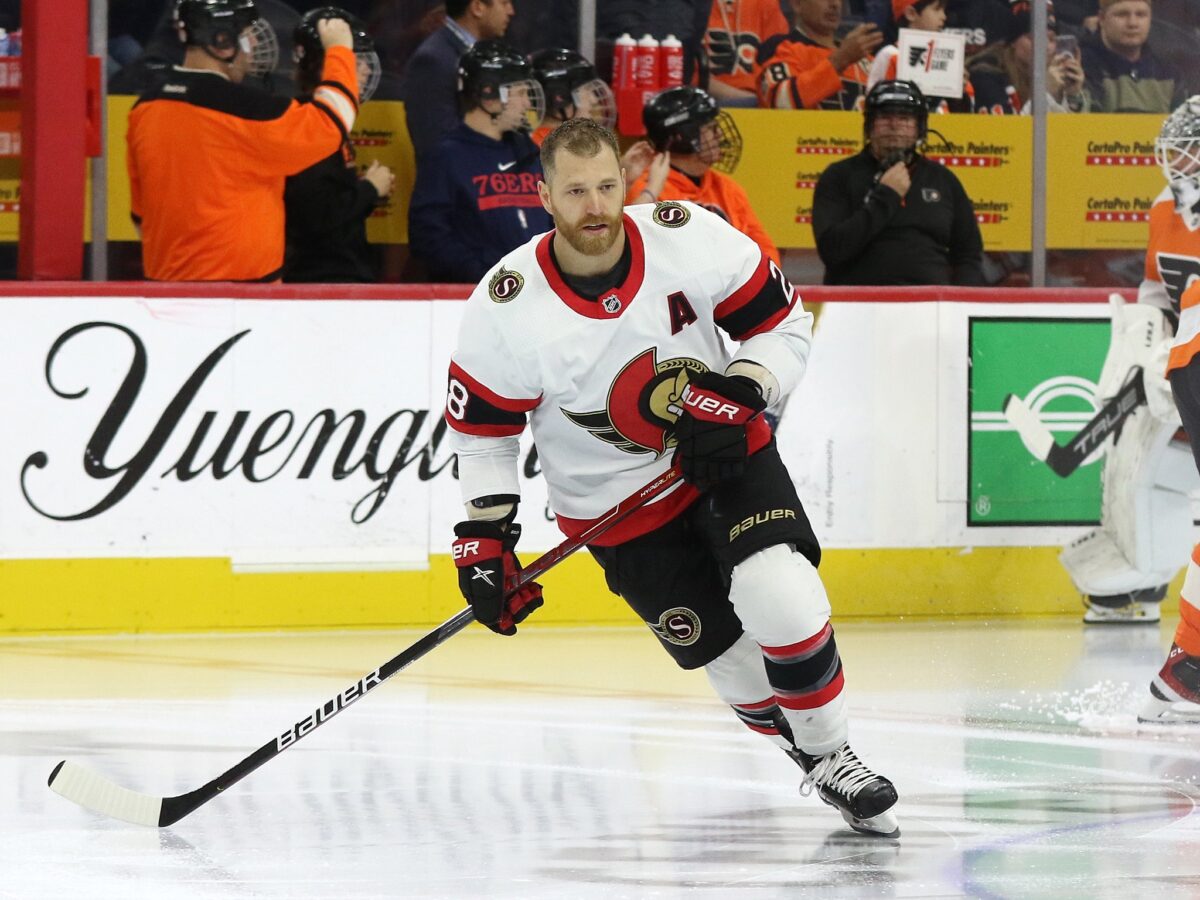
If Senators management is wise, they’ll give Smith some more time to demonstrate that he can help turn the Senators into what most Ottawa fans still believe they are – a team that can contend for a Stanley Cup in the next few years. That requires stability behind the bench – at least for now.
